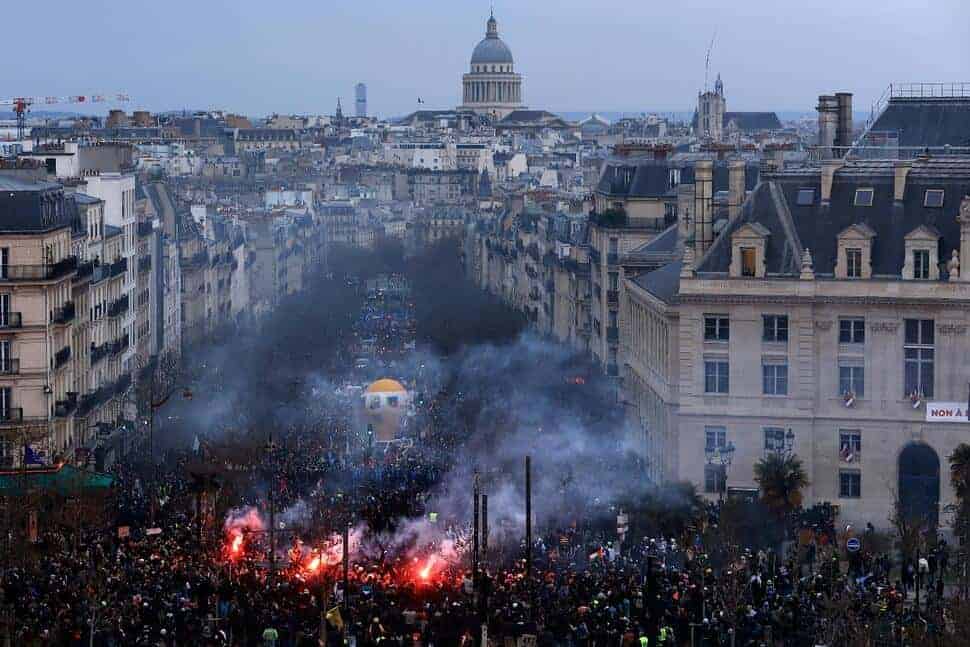More than a million demonstrators have marched in cities and towns across France in a new round of protests and strikes against the government’s plan to raise the retirement age to 64
PARIS — More than a million demonstrators marched in cities and towns across France on Tuesday, in a new round of protests and strikes against the government’s plan to raise the retirement age to 64. Unions called for more protests this weekend while warning that the situation could become “explosive.”
The government “must withdraw its project now,” unions demanded after an evening meeting to decide their course of action.
They had hoped Tuesday’s show of force would undermine President Emmanuel Macron’s showcase draft legislation. The bill was under debate in the Senate this week.
Garbage collectors, utility workers, train drivers and others walked off the job across the country to show their anger at the reform.
“The silence of the president constitutes a grave democratic problem that inevitably leads to a situation that could become explosive,” unions said in a joint statement.
They asked for an urgent meeting with authorities while calling on citizens to “continue and amplify” the protests, and join new marches Saturday.
Demonstrators took to the streets in Paris, Marseille, Nice and other cities. Minor clashes with police broke out in Nantes, Rennes and Lyon. In Paris, police used tear gas to stop black-clad protesters from carrying out violent attacks on banks and shops and to disperse them long after the protest march ended.
Paris Police Chief Laurent Nunez said that 43 people were detained in a march that drew 81,000. The Interior Ministry said that nearly 1.3 million demonstrated around France. The CGT union put the number of Paris protesters at 700,000 and estimated 3.5 million around the country.
In the French capital, workers, families and activists gathered in a joyful atmosphere, chanting slogans.
Opinion polls suggest that most French voters oppose the bill.
“To see so many people today gives me hope,” said 38-year-old Sarah Durieux. The activist said the protests have extended beyond their initial agenda, attracting climate activists, feminists and students. “The movement has spread because to defend workers’ rights means defending a social model based on solidarity,” she said.
Unions threatened to freeze up the French economy with work stoppages across multiple sectors, most visibly an open-ended strike at the SNCF national rail authority.
Some unions have called for open-ended strikes in sectors from refineries and oil depots to electricity and gas facilities.
All oil shipments in the country were halted Tuesday amid strikes at the refineries of TotalEnergies, Esso-ExxonMobil and Petroineos groups, according to the CGT.
Truckers sporadically blocked major highways in go-slow actions near several cities.
In Paris, garbage collectors started an open-ended strike and on Tuesday morning blocked access to the incineration plant at Ivry-sur-Seine, south of the capital, Europe’s biggest such facility.
“The job of a garbage collector is painful. We usually work very early or late … 365 days per year. We usually have to carry heavy weight or stand up for hours to sweep,” said Regis Viecili, a 56-year-old garbage worker.
Some strikers said that the work pace has a negative impact on their health, causing tendinitis and aches. The hard work earns them a special pension plan with retirement at 57. The government’s planned changes would make them work until 59.
“A lot of garbage workers die before the retirement age,” Viecili said.
Figures from government statistics agency Insee showed that in 2009-2013, the latest period studied, the life expectancy of unskilled male workers was 6.4 years below that of men in management positions — compared with 3.2 years of difference for women.
A fifth of flights were canceled at Paris’ Charles de Gaulle Airport and about a third of flights at Orly Airport. Trains to Germany and Spain were largely halted, and those to and from Britain and Belgium were reduced by a third, according to the SNCF rail authority.
Most high-speed trains and regional trains were canceled.
Public transportation and other services were disrupted in most French cities. In Paris, the Eiffel Tower was closed, as was the Palace of Versailles, west of the capital.
According to the Education Ministry, about a third of teachers were on strike nationwide.
At Paris-Nord train station, some unionists voted to continue the strike Wednesday.
“We are convinced that the government will step back only if we block the economy,” said Xavier Bregail, a 40-year-old train driver in northern Paris. “The subject behind this is inflation, soaring food and energy prices. I just want to live decently from my work.”
Transport company RATP said that disruptions on the Paris Metro would continue Wednesday.
The reform would raise the minimum pension age from 62 to 64 and require 43 years of work by 2030 to earn a full pension, amid other measures. The government argues the system is expected to dive into deficit within a decade as France’s population ages and life expectancy lengthens.
At the Saint Lazare train station in Paris, Briki Mokrane, a 54-year-old fire safety worker, said “obviously it’s very very difficult for workers, but unfortunately in France it’s always the same: we have to have strikes or demonstrations to preserve our rights.”
Left-wing lawmakers say companies and the wealthy should pitch in more to finance the pension system.

